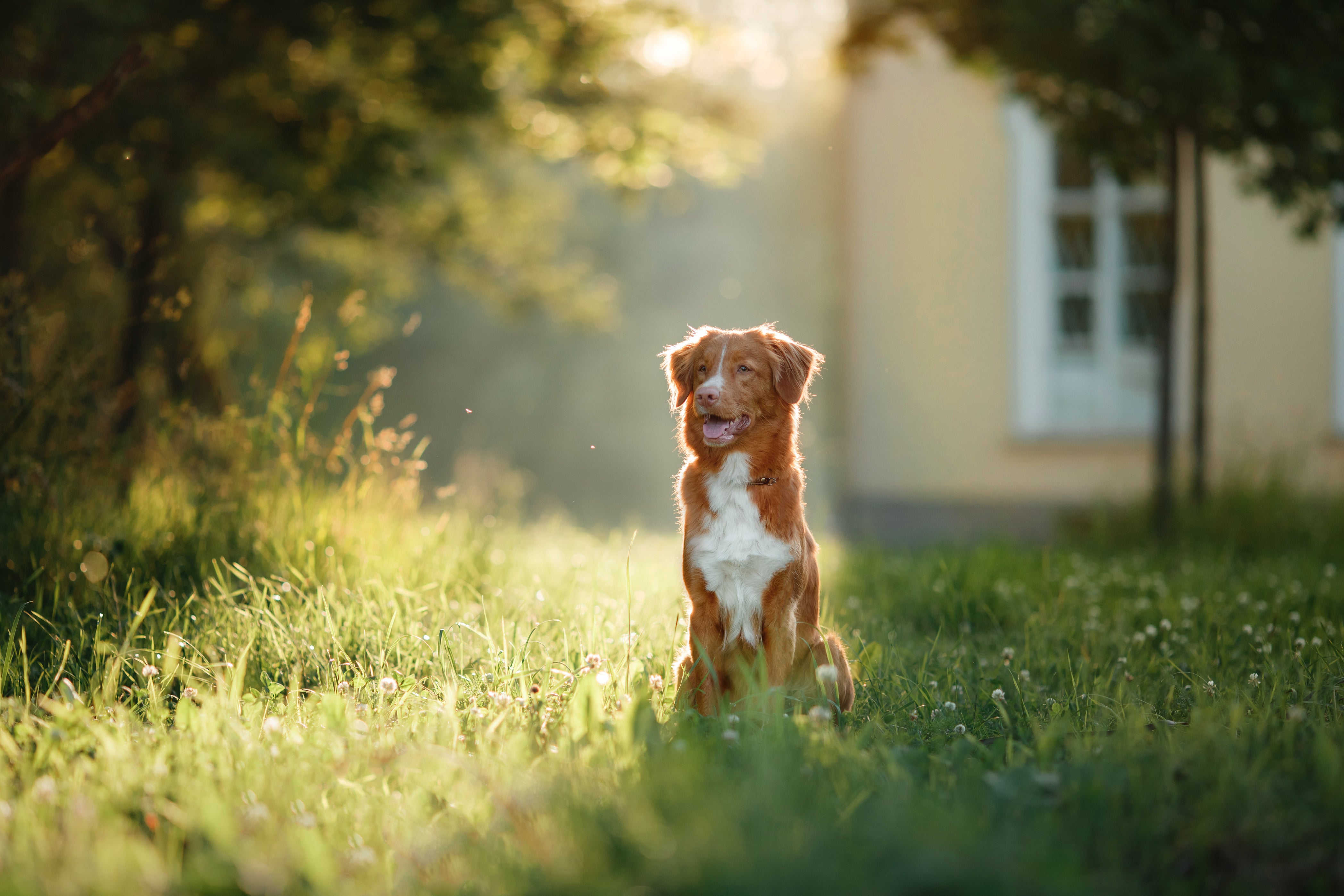Nova Scotia Duck Tolling Retriever
The Nova Scotia Duck Tolling Retriever, also known as the "Toller," is a medium-sized ball of energy disguised in a handsome red coat. This breed boasts a thick, water-repellent outer coat with a soft undercoat, perfect for their love of swimming and retrieving waterfowl. Their coloring ranges from a light orange to a deep red, often with a touch of white on the face, feet, and the tip of their ever-wagging tail. Built for agility and endurance, Tollers are smaller and more athletic than most retrievers.
Breed characteristics carousel
Learn More
Need to Know
- Suitable for owners with some experience
- Extra training required
- Generally healthy breed
- Enjoys active walks
- Medium dog
- Minimal drool
- Requires frequent grooming
- Quiet dog
- Barks and alerts to visitors/anything unusual
- Could have issues with unknown dogs but gets along with known dogs
- Gets along with other pets with training
- May need additional supervision to live with children
- Needs a large yard, either in suburban or rural areas
- Can be left alone occasionally with training
- AKC Registered Breed

Personality
Duck Tollers possess boundless energy and a playful spirit that makes them a joy to have around. Whether you're training for agility competitions or simply enjoying a walk, Nova Scotia Duck Tolling Retrievers give their all with infectious enthusiasm. These intelligent pups may surprise you with their "Toller scream" when particularly excited, but their friendly nature and trainability make them wonderful companions for active families and dog enthusiasts.
Developed in Nova Scotia's Yarmouth County, these "Decoy Dogs" were initially called the Yarmouth Toller or Little River Duck Dog. Their unique hunting style involved mimicking the playful antics of foxes, luring ducks within range with their enticing red coat, feathery tails, and playful movements. This "tolling" technique, derived from a Middle English word meaning "to lure," is a rarity in the canine world, shared only with the Dutch Kooikerhondje. Interestingly, upon gaining AKC approval in 2003, the Nova Scotia Duck Tolling Retriever held the title of the breed with the longest name, surpassing the Petit Basset Griffon Vendeen.
The Nova Scotia Duck Tolling Retriever is an ideal companion for active owners and families who crave adventure. These versatile pups are happy to adapt to various lifestyles as long as exercise is a priority. Rain, shine, wind, or snow, these enthusiastic retrievers are always ready to hit the ground running, so owners who enjoy an active lifestyle.
Daily varied activities are ideal to keep these intelligent and curious pups stimulated and happy. Activities that tap into their natural instincts, like swimming or fetching, are a surefire way to win their hearts. Their eagerness to please and trainability make them excel in dog sports like agility, flyball, or fieldwork. These activities provide the physical outlet Tollers crave and strengthen the bond between dog and owner.
The Duck Toller is surprisingly adaptable when it comes to living space. Their compact size makes them suitable for various housing situations, from apartments to homes with yards. Tollers are happy as long as they have access to engaging walks in a variety of locations.
The Nova Scotia Duck Tolling Retriever breed boasts a beautiful double coat that's water-repellent and weatherproof. While medium in length, it requires regular maintenance to keep it looking its best. Frequent brushing is sufficient, but daily brushings are recommended during shedding seasons, especially for the finer fur around the ears, which is prone to matting. Minimal trimming is needed beyond neatening the fur around the ears and feet. However, regular grooming should include checking ears and paws for debris and trimming nails to maintain paw health and good traction indoors.
Intelligent and eager to please, Tollers thrive on positive reinforcement training. As quick learners, they enjoy a variety of tasks and can excel in various "doggy jobs." However, Nova Scotia Duck Tolling Retriever puppies and dogs are not workaholics; training should be engaging and fun to stimulate their curious minds. Like many retrievers, they can be a bit possessive, so focusing on happy exchanges with treats or toys is vital. Duck Tollers can also benefit from learning to "settle" and calmly wait for their turn. Short, positive training sessions with clear expectations will help Tollers understand the rules and ensure a happy, well-behaved companion.
A Nova Scotia Duck Tolling Retriever dog’s eagerness to please and trainability make them excellent family companions. These enthusiastic pups are happiest outdoors, making them ideal partners for adventuresome families. While they get along well with older children, their need for constant activity might be overwhelming for families with very young kids.
The cost of a Nova Scotia Duck Tolling Retriever from a breeder is significantly more than the cost of adopting one from a local shelter or rescue. The adoption fee usually covers additional items such as spaying or neutering, vaccines, and microchipping.

Learn more about feeding and caring for your Nova Scotia Duck Tolling Retriever on Purina.
Did You Know?
- This breed’s name comes from the old word "toller," which means "to entice." Back in the day, they wiggled their white-tipped tails and made playful movements to attract ducks, then switched to retriever mode and brought back the birds.
- Nova Scotia Duck Tolling Retriever dogs are the smallest of the retriever breeds.
- Tollers are known for their expressive tails, which they use to communicate their emotions.
- When excited, they might even let out a high-pitched "Toller scream."

